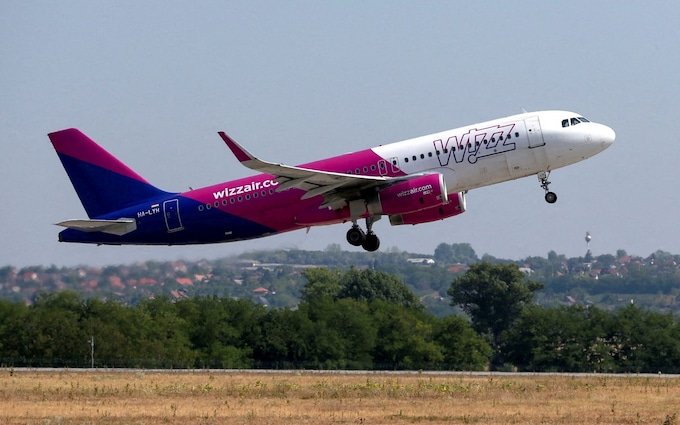Air traffic control disruption, system outages and poor weather blamed for flight delays

Wizz Air had the longest delays
Credit: Reuters
Wizz Air has been ranked the worst airline for UK flight delays for the third year in a row.
The low-cost carrier’s departures from UK airports were an average of 31 minutes and 36 seconds behind schedule in 2023,according to analysis of Civil Aviation Authority (CAA) data.
This was a reduction of nearly a third compared with 2022,but means the airline recorded the worst punctuality for UK flights for three consecutive years.
Turkish Airlines and Tui ranked in second and third place,while British Airways was 10th,with an average delay of 21 minutes and 36 seconds,while Virgin Atlantic was second best of all airlines serving the UK with delays of 13 minutes and 42 seconds.
Irish regional carrier Emerald Airlines recorded the best performance last year,beating Virgin’s average by 34 seconds.
Wizz Air said it has made “significant improvements” but acknowledged there is “still work to be done”.
A BA spokesman said: “Like other airlines,last year we experienced a number of issues outside of our control that have had an impact on our customers,such as air traffic control industrial action,the national air traffic control system outage and poor weather conditions.
“Our teams work incredibly hard to get people away on time and we apologise to customers for any disruption they’ve faced during these challenging periods.”
Virgin Atlantic was approached for comment.
The analysis took into account all scheduled and chartered departures from UK airports by airlines operating more than 2,500 flights. Cancelled flights were not included.
Aviation consultant John Strickland said Wizz Air had “many unhappy customers” – particularly in 2022 – as it struggled with punctuality due to being “over ambitious” in terms of how many flights it could operate reliably after coronavirus travel restrictions eased.
He said the airline has “put a lot of effort in” to improve through measures such as replanning rosters and having more standby aircraft available,but “the fruits of that will not be seen immediately”.
Asked why Wizz has been able to boost passenger numbers despite suffering delays,Mr Strickland said the low-cost carrier was “price competitive” and had the most capacity on many routes serving central and eastern Europe.
Rory Boland,editor of magazine Which? Travel,said: “These latest delay figures will come as no surprise to travellers,who find themselves in the outrageous position of paying record amounts for air fares and in return receiving unreliable services.
“Wizz Air recently took the bottom spot in our annual airline satisfaction survey and it’s clear its passengers are still having a torrid time.”
In January,the CAA said enforcement action against Wizz Air led to the airline paying a total of £1.2 million to UK-based passengers whose financial claims for delay compensation were initially rejected by the airline.
This included payments for expenses such as replacement flights,food and hotel rooms during disruption.
Dale Keller,chief executive of the Board of Airline Representatives in the UK,a body representing airlines operating in the UK,described 2023 as “an extremely challenging year,particularly over the summer”.
Mr Keller said many delays were caused by factors outside of airlines’ control,such as air traffic control disruption including strikes in France and the National Air Traffic Services meltdown on August 28 which grounded flights across UK airports.
He added that airlines are confident their operations are “in a pretty good place” and punctuality has “continued to exponentially improve” this year.
Last August’s air traffic control meltdown saw hundreds of thousands of air passengers displaced after a computer error at a base in Hampshire crashed the UK’s entire en-route air traffic control network.

© TopicFashion Privacy Policy Contact us